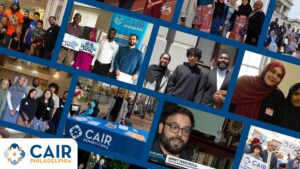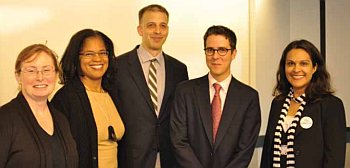
Penn. Interfaith Leaders to Challenge Anti-Sharia Bill
(PHILADELPHIA, PA 12/12/11) — On Wednesday, December 14, the Council…

(PHILADELPHIA, PA 12/12/11) — On Wednesday, December 14, the Council…

 You knew this was coming. The Pennsylvania Legislature is currently considering an “Anti-Sharia Law” law that’d ban state courts from considering any “foreign legal code or system” that isn’t identical with the Constitution. According to an article on the bill at the Pittsburgh Post-Gazette, the potential bill, likely aimed at those who fear Islam creeping onto their front lawn, is having the opposite effect and has decidedly offended, according to the Gazette, “some Jews.”
You knew this was coming. The Pennsylvania Legislature is currently considering an “Anti-Sharia Law” law that’d ban state courts from considering any “foreign legal code or system” that isn’t identical with the Constitution. According to an article on the bill at the Pittsburgh Post-Gazette, the potential bill, likely aimed at those who fear Islam creeping onto their front lawn, is having the opposite effect and has decidedly offended, according to the Gazette, “some Jews.”

(WASHINGTON D.C., 12/6/2011) — The Council on American-Islamic Relations (CAIR) is…

 Amara Chaudhry at one time was with a law firm in Charleston, W.Va., and more recently the public defender’s office in Montgomery County prior to joining CAIR. Although only with the firm for a short time, she also made sure to take on a wide variety of pro bono matters in addition to her criminal defense work. And Chaudhry may be the exception to the rule of “networking” in that all of her jobs were obtained through cold resume sends. She also emphasized the point that you need to be willing to do the work for free before someone will pay you to do it.
Amara Chaudhry at one time was with a law firm in Charleston, W.Va., and more recently the public defender’s office in Montgomery County prior to joining CAIR. Although only with the firm for a short time, she also made sure to take on a wide variety of pro bono matters in addition to her criminal defense work. And Chaudhry may be the exception to the rule of “networking” in that all of her jobs were obtained through cold resume sends. She also emphasized the point that you need to be willing to do the work for free before someone will pay you to do it.

 Did you know that the United States Government has an official policy which indicates that federal employees can be denied promotions, and other opportunities for job advancement, simply because they have a friend, relative, or acquaintance in a Muslim-majority country? It’s true. For federal employees, promotions, and other opportunities for job advancement, are highly dependent upon the ability to obtain a requisite security clearance, and such clearances can be denied due to concerns over “foreign influence.”
Did you know that the United States Government has an official policy which indicates that federal employees can be denied promotions, and other opportunities for job advancement, simply because they have a friend, relative, or acquaintance in a Muslim-majority country? It’s true. For federal employees, promotions, and other opportunities for job advancement, are highly dependent upon the ability to obtain a requisite security clearance, and such clearances can be denied due to concerns over “foreign influence.”


![]() "All-American Muslim is a much needed counter-narrative to negative images of Muslims that seem to saturate the news," says Rugiatu Conteh, outreach and communications director for the Philadelphia chapter of the Council on American-Islamic Relations.
"All-American Muslim is a much needed counter-narrative to negative images of Muslims that seem to saturate the news," says Rugiatu Conteh, outreach and communications director for the Philadelphia chapter of the Council on American-Islamic Relations.

![]() "I have been monitoring and following Libya all my life," said Osama Al-Qasem, 56, who left the country as a child and lives in Holland, Bucks County. "My father was a lawyer. Life was very pleasant until Gadhafi came to power." Although Al-Qasem was just 12 when he left for boarding school in England, he recalls how the promise of the 1969 coup that began Gadhafi's reign quickly soured.
"I have been monitoring and following Libya all my life," said Osama Al-Qasem, 56, who left the country as a child and lives in Holland, Bucks County. "My father was a lawyer. Life was very pleasant until Gadhafi came to power." Although Al-Qasem was just 12 when he left for boarding school in England, he recalls how the promise of the 1969 coup that began Gadhafi's reign quickly soured.

Forced to Pray by a Dumpster, then Terminated for Hajj…